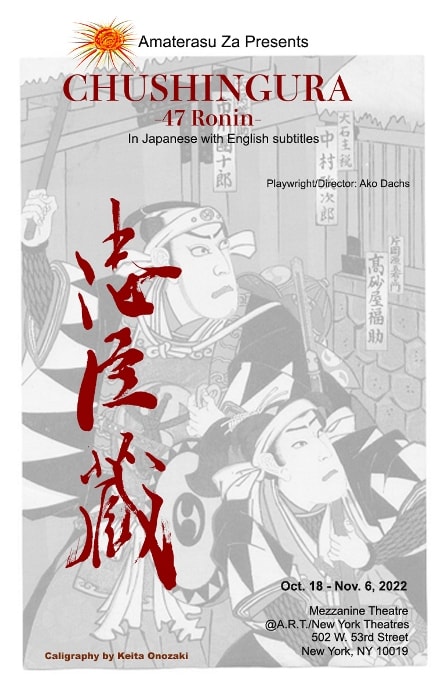In keeping with its mission of bringing Japanese classics to an American audience, the English-Japanese bi-lingual company Amaterasu Za (meaning “theater that illuminates”) is now presenting the Off-Broadway premiere of Chushingura – 47 Ronin at A.R.T./New York, following a two-year pandemic postponement. Performed in alternating segments of Japanese and English (with supertitle translations) by a cast of NYC-based Japanese actors, the affecting narrative, adapted and directed by Amaterasu Za’s Founding Artistic Director Ako Dachs (a former member of Japan’s all-female Takarazuka Theatre Company) is based on true historical events that occurred at the turn of the 18th century, and have been told countless times in Japanese Kabuki, Bunraku, plays, books, prints, movies, TV dramas, and animated series, and even in a short story by Argentina’s Jorge Luis Borges.

Set in 1702-03, during the Edo Period (1603-1867), when Japan was led by a shogun (the military commander and de facto ruler, appointed by the figurehead emperor), the gripping production tells the story of a momentous fight between two lords in Edo Castle. After being insulted and embarrassed by the corrupt and greedy Lord Kira, Lord Asano attacks him with his sword, breaking the rule that prohibits violent conflict there. Despite Lord Kira’s provocation, and the law that demands both parties involved be punished severely, the shogunate only gives Lord Asano the death sentence of seppuku (or hara-kiri, a form of Japanese ritual suicide by disembowelment with a short sword, practiced by samurai in their code of honor to avoid disgrace or execution), confiscates his land and property, and disbands his Akō Asano clan and samurai. Enraged by the unjust sentence, 47 of his loyal ronin (wandering samurai without a lord or master) secretly plan for two years to avenge his death by killing Lord Kira, an act they know will result in their own seppuku sentences. Their courageous self-sacrifice, and standing up to injustice, made them celebrated heroes in Japan, and their graves at Sengaku-Ji Temple in Tokyo (formerly Edo) became a place of veneration.

Starring Ako as the narrator and “patient wife” of the ronin leader, the show shifts back and forth between enacted scenes in Japanese and segments of her direct-address narration in English that provide significant historical details and identify the many figures in the story she recounts. Each member of the company – Yoshi Amao, Saori Goda, Tatsuo Ichikawa, Rina Maejima, Koji Ono, Jun Suenaga, Yasu Suzuki, Hiroko Yonekura, and Minami Yoshimura – most playing multiple roles, with the women embracing the Japanese tradition of cross-gender casting, excels in delivering the personalities, emotions, and convictions of their characters, and the customs, physical deportment, and moral principles of their era, with clarity and precision, in thoroughly compelling and believable performances that both enlighten and engross, under Ako’s subtle direction (which leads up to but omits the blood and gore of the death scenes).

A top-notch design contributes to the production’s beauty and authenticity. Costumes by Ako and wigs by Mitsuteru Okuyama transport us to the place and period, as does the haunting sound and music design by Fumi Tanakadate. Lighting by Aaron Bowersocks is focused and evocative, and Joshua Dachs’ spare scenic design, with a backdrop of Japanese shoji screens and a vertical projection screen in the left foreground showing Japanese calligraphy and black-and-white images of the referenced locales (illustrations by Huumi Kamata), allows the cast to enter and exit the stage efficiently, while also providing ample space for the fast-paced skillfully executed sword fights, with expert fight direction by Kyo Kasumi.
Amaterasu Za’s stellar presentation of one of the most enduring and riveting classics in Japanese history is a must-see production, with masterful storytelling, superb acting and direction, and an exquisite design that are faithful to the period, the culture, and the ethical message of justice and loyalty.
Running Time: Approximately one hour and ten minutes, without intermission.
Chushingura – 47 Ronin plays through Sunday, November 6, 2022, at Amaterasu Za, performing at A.R.T./New York, Mezzanine Theater, 502 West 53rd Street, NYC. For tickets (priced at $60, or $30 for seniors and students, plus fees), go online. Everyone must show proof of COVID-19 vaccination to enter and must wear a mask in the theater.





